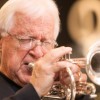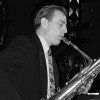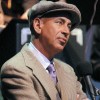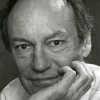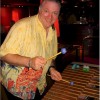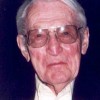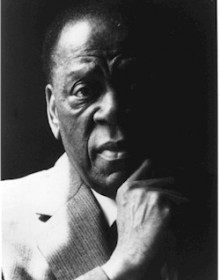
Acclaimed throughout the world as one of the great vocal artists of our time, William Warfield was a star in every field open to a singer's art.
Since Warfield's remarkable debut in New York's Town Hall of March 19, 1950, his career flourished unabated in a wide assortment of memorable achievements. Immediately, in 1950 he was invited by the Australian Broadcasting Commission to tour that continent for 35 concerts June through September (their winter season), including solo performances with their five leading symphony orchestras. While that tour was still proceeding, his manager back in New York had signed a contract with MGM for Warfield to play the featured role in the 1951 version of the great Edna Ferber-Jerome Kern musical Show Boat as Joe the Dock Hand, singing "Old Man River."
He was born in West Helena, Arkansas on January 22, 1920, the eldest of five sons. He grew up in Rochester, New York and entered the Eastman School of Music of the University of Rochester. There the young singer earned his Bachelor of Arts degree and, after four interim years in military service, returned to Eastman to study for his Masters.
After military service, Warfield was engaged for singing lead in the national touring company of the Broadway hit Call Me Mister.
Through the years, critics commented that William Warfield's superiority as recitalist stemmed from his unusual ability as an actor, which he proved often in singing roles as well as those merely spoken. His most famous role was the title role in George Gershwin's "folk opera" Porgy and Bess.
A memorable and important segment of Warfield's professional life was in his performance in 1957 and '59 on NBC-TV's Hallmark Hall of Fame production of Marc Connely's The Green Pastures, in his starring role as "De Lawd."
Numerous honors and awards William Warfield received have included his honorary Doctor of Laws from the University of Arkansas in 1972.
At the graduation ceremonies of Lafayette University (Easton, PA) in June 1977, he received another honorary Doctorate for his "Contributions in the Arts." Similar honorary degrees have been awarded Warfield: 1982 from Boston University; 1983 as "Doctor of Human Letters" from Augustana College, Illinois; and in 1984 James Milliken University also in Illinois. For a good many years, the artist dedicated time and devotion to the National Association of Negro Musicians (NANM).
In March 1984 he was the winner of a Grammy in the "Spoken Word" category for his outstanding narration of Aaron Copeland's A Lincoln Portrait accompanied by the Eastman Philharmonic Orchestra.
Since 1975, when he accepted his appointment as Professor of Music at the University on Illinois (Champaign-Urbana Campus), Dr. Warfield was able to devise his schedule for continuing outside concert performances along with master classes at many institutions of learning along with his regular classes at Illinois. He was a professor at Northwestern University since 1994.
Warfield was appointed as Chairman of the Illinois Voice Department. In 1989, he began touring with The Jim Cullum Jazz Band as narrator in the band's concert presentation of Porgy and Bess. In 1996, live presentations of Show Boat and, in 1997, Harlem Rhapsody were added to the JCJB/Warfield touring schedule.
William Warfield died in 2002.
WILLIAM WARFIELD—A REMEMBRANCE
by Jim Cullum Jr.
In 1987 the Jim Cullum Jazz Band version of Porgy and Bess was released on the Columbia Masterworks label, and the next year we began to perform this work in concerts around the country. I had written a narration for Porgy and Bess, and our tour plan was to ask each local presenter to arrange for a hometown celebrity, usually a newscaster, to read my narration. This was to be interspersed with the band's rendition of selections from Porgy and Bess. The complete package made for excellent concerts as we performed a jazz version of the entire opera, while the narrator told its story.
One of the first Porgy concerts was at the University of Illinois at Champagne/Urbana. While the band was setting up, I began to inquire about the narrator for this particular show. I learned that nothing had been arranged, as it was thought that a member of the University faculty could handle the job.
I was beginning to mildly protest when they trotted out this "faculty member," and in this unexpected way I met William Warfield for the first time. Of course, I knew of the great man's singing and was completely thrilled at the prospect of having him read my narration.
Bill, as he quickly advised me to call him, was easy to meet and easy to talk to. As we went over the script it was clear that he knew the subject better than I did. He had performed in the role of Porgy many times. I made a bold suggestion: "Would you like to sing pieces of these melodies as you introduce them?" His face lit up at the prospect.
The result took our Porgy and Bess to a new level. Bill became our regular narrator and traveled all over the United States with us. We even performed Porgy four times at the famed Cervantino Festival in Mexico.
As our public radio experiment began to take shape, we naturally looked for opportunities to involve Bill. He was superb in every role. He played the voice of King Oliver on one of them and W.C. Handy on another. In two shows he read the poetry of Langston Hughes. He spoke of the blues and sometimes he sang spirituals. Bill charged everything he touched with magic.
Eventually, we applied a similar treatment to the classic musical Show Boat. Bill narrated this as well. As an encore I regularly asked Bill to sing "Ol' Man River," his signature song. This always stole the show.
All of this stands for me as high points of a long life in music. Not only was Bill an amazing musical talent, he was a great actor and showman. As a veteran performer he was able to bring to bear all his natural ability, his scholarship, and his lifetime of experience.
Off-stage he was non-stop fun, with one joke after another. I enjoyed him and we spent a lot of time together. Gradually I learned a lot about his life.
Bill was born in the Deep South but his family soon moved to Rochester, N.Y., where his minister father headed the local Black Baptist Church. He learned much of his music in that church.
Bill Warfield loved Black history and culture and music but he was a product of an integrated boyhood spent in Rochester. He said that during WWII he entered the U.S. Navy and was assigned to an all-black unit, and that being in a segregated world, even though it was black, felt strange to him. Through his life he carried with him the color-blind attitude our country is still struggling to attain.
I can say nothing but good things about Bill. To have him as a friend was such an honor.
The last time I saw Bill Warfield was in July, 2000. We performed our 200th Jazz Mass, this time at Grace Cathedral in San Francisco. Bill was with us to sing Ellington's "In the Beginning, God" and "Come Sunday," and then an inspired version of the Spiritual "Go Down Moses."
On August 26 of this year I had been quietly going over a few ideas to include Bill in next season's Riverwalk shows. Don Mopsick's phone call interrupted my reverie. Had I heard, he asked, the news flash that William Warfield had died?


